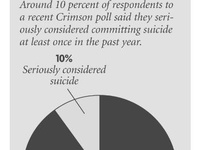The 2002 graduate, who suffered from depression and asked that her name not be used, says that her assistant freshman dean tried to convince her that leaving school was the best option, even before she had fully explored Harvard’s mental health services.
She says that even after she visited UHS and received a prescription for antidepressants, the assistant dean continued to try to convince her that she was making a mistake in staying in school.
“I was hopeful about the medicine working, and she was like, ‘What if it doesn’t work? What if you get a C on your transcript? You won’t get into law school,’” the graduate says. “She was giving me all these depressing things to think about that a depressed 18-year-old doesn’t need to hear right then.”
The 2002 graduate says that once the medicine began to work, her grades improved significantly and she finished the year with grades in the A and B range.
“People are too often encouraged to take time off, and there’s just not enough listening of what students have to say,” she says.
Jeremy R. Jenkins ’97-’98, co-founder of the Mental Health Awareness and Advocacy Group, says he thinks a semester off is sometimes the best solution for struggling students—but he objects to the cold administrative tone the Administrative Board takes in the process.
Jenkins, who took time off to cope with his depression while he was an undergraduate, says his senior tutor was helpful to him, but that other administrators can make the Ad Board procedure painful for mentally ill students.
“There are people that get it, and there are others that just don’t. If you have someone, a senior tutor or someone, who doesn’t get it, they can be very adversarial and very confrontational,” he says.
Jenkins says that the effect of the process is to give students the impression that the College does not care about their problems and simply wants them gone.
“The idea that you are getting someone off campus, that you are shuffling them off on someone else, a lot of students have felt that way,” says Jenkins. “At the same time, sometimes [time off] is necessary. The difference is how that is presented to you, and the Ad Board does not do a good job explaining itself.”
The 2002 graduate and Jenkins say that they feel administrators and Ad Board members too often assume that students have family to lean on when they require students to take a leave of absence.
“There’s this general assumption that you can always go home and your parents will take care of you, but a lot of people really have problems with their families,” the 2002 graduate says.
Jenkins says the Ad Board must consider that the student’s situation at home may not be more conducive to recovery than the campus.
“There are issues about what environment you are going back to, and what access you are going to have to health care there. And this may not be feasible at all, to suddenly pack up and go,” Jenkins says.
Kristin M. Waller ’05, who has had bouts with depression since seventh grade and has cut herself periodically during her time at Harvard, says it was crucial to her mental health that the College did not force her to take a leave of absence.
Read more in News
Chapel May Remain in Cambridge Permanently















